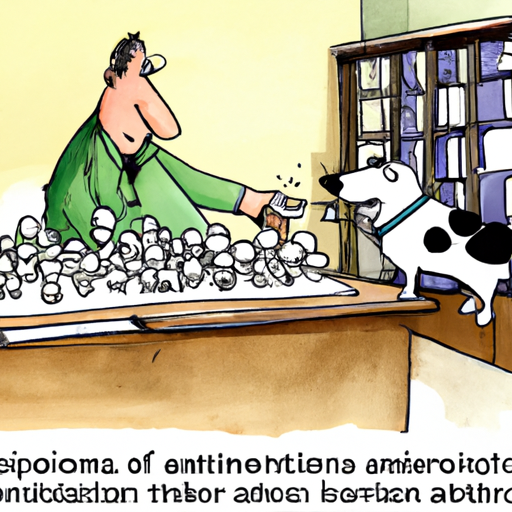As a caregiver for your furry friend, it’s natural that you want to ensure their well-being, and sometimes, that might mean resorting to medical treatments, such as antibiotics. This article will guide you through some of the most common antibiotics for dogs, their uses, and potential side effects.
Antibiotics for Dogs: The Basics
Before we dive into the specifics, it’s essential to understand what antibiotics are. Simply put, antibiotics are drugs used to fight bacterial infections. They work by either killing the bacteria or preventing them from multiplying.
When it comes to dogs, it’s crucial that you never self-medicate. Always consult a vet before giving your pet any medication, including antibiotics.
Common Antibiotics for Dogs
Here are some of the most common antibiotics that are safe for dogs:
-
Amoxicillin: This is often the first line of defense against bacterial infections in dogs. It’s a broad-spectrum antibiotic, meaning it can treat a wide variety of bacterial infections.
-
Cephalexin: This antibiotic is typically used to treat skin infections and urinary tract infections in dogs.
-
Enrofloxacin: This is used to treat infections caused by gram-negative bacteria, such as those responsible for urinary tract infections, skin infections, and respiratory infections.
-
Clavamox: This is a combination of amoxicillin and clavulanic acid, used to treat skin and soft tissue infections, dental infections, and urinary tract infections.
-
Doxycycline: This antibiotic is used to treat infections like Lyme disease, Rocky Mountain spotted fever, and other tick-borne diseases.
Remember, these antibiotics should only be administered under veterinary supervision.
Potential Side Effects of Antibiotics in Dogs
Just like in humans, antibiotics can cause side effects in dogs. Here are some common side effects that you might notice:
- Loss of appetite
- Vomiting
- Diarrhea
- Allergic reactions
If you notice any of these side effects, it’s important to contact your vet immediately.
Administering Antibiotics to Your Dog
When your vet prescribes antibiotics for your dog, they’ll provide specific instructions on how to administer them. It’s important that you follow these instructions carefully.
Here are a few general tips:
- Give the antibiotic at the same time every day.
- Don’t miss a dose.
- Complete the full course, even if your dog seems to be feeling better.
FAQ
Q: Can I give my dog human antibiotics?
A: No, you should never give your dog human antibiotics without consulting a vet.
Q: How long does it take for antibiotics to work in dogs?
A: It can take anywhere from 24 to 72 hours, depending on the antibiotic and the severity of the infection.
Q: What should I do if my dog misses a dose?
A: If it’s close to the time for the next dose, skip the missed dose and continue with the regular schedule. Never double up on doses.
Q: Can antibiotics make my dog sick?
A: Yes, antibiotics can cause side effects like vomiting and diarrhea. If this happens, contact your vet.
Remember, the health of your pet should always be your top priority. Consult with your vet if you have any concerns or questions about your dog’s health.



